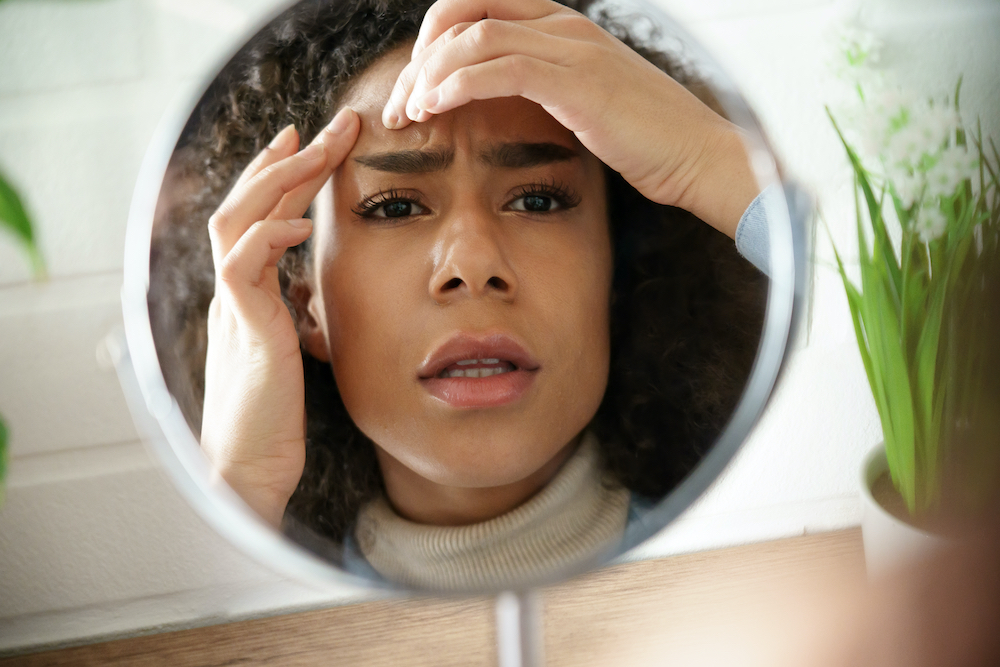What Type of Acne Do You Have?

Pimples, blemishes, zits. No matter what you call them, they all mean the same thing- acne. Acne is a skin condition that affects up to 50 million people a year in the United States. While extremely common, it is still one of the most frustrating conditions to deal with, especially since it comes in so many different forms. From whiteheads to blackheads and pustules to cysts, acne bumps can vary in their appearance, cause and treatment.
The most effective way to heal your acne is to consult with a dermatologist. A doctor can properly diagnose the types of acne you have, discuss your medical history and lifestyle factors and work with you to determine the best course of treatment.
Knowing a little more about your skin can help you ask the right questions when you go into your dermatologist’s office. Read on to learn how to identify 6 types of acne so you can confidently work with your dermatologist.
6 Common Types of Acne
Acne can show up anywhere on the body, but usually pops up on the face, chest or back. It can also affect anyone, including people of all ages, ethnicities and skin types.
Whiteheads
When a pore is clogged throughout with sebum, skin cells or bacteria, it can become a whitehead. A whitehead will appear as a slightly red or flesh-colored bump with a white head. These pimples are known as closed comedones because the pore is closed at the surface, creating the white cap.
While it might be tempting to pop or pick a whitehead, you should never pick your skin. Picking a whitehead can result in infection or scarring. Products that contain benzoyl peroxide or salicylic acid can be effective over-the-counter treatments. A dermatologist may be able to prescribe stronger topical medications to help exfoliate dead skin cells and remove excess oil.
Blackheads
Blackheads are also called open comedones because the pore is open to the air. The pore is clogged with sebum and dead skin cells. When those substances come into contact with the air, they darken in color, giving these pimples their name. They are usually fairly flat against the skin and non-inflammatory, so they are rarely red or painful.
Typical treatments for blackheads can include over-the-counter topical medications. Extractions by a dermatologist or esthetician can be effective for removing the dead skin cells and oils without causing infection.
Papules
Papules are swollen, red and often painful to the touch. When dead skin cells and oil mix with bacteria, it can create a build-up in the pore underneath the skin. The bacteria can emerge from the pore and create inflammation in the surrounding skin.
These inflamed and swollen pimples might respond to treatments that reduce inflammation such as benzoyl peroxide and retinoids. Antibiotics may also be an effective treatment if recommended by your dermatologist.
Pustules
Pustules are often mistaken for whiteheads because they have a white or yellow, pus-filled cap. Unlike whiteheads, pustules are inflamed and will have a red ring surrounding the white top. Pustules are red, painful and swollen.
Similar to whiteheads, it may be tempting to pick or pop a pustule, but resist the urge. Picking at a pustule can create further inflammation, pain and scarring. If you suffer from frequent pustules, it is recommended that you visit a dermatologist who can recommend a strong treatment plan.
Nodules
More severe acne can present as nodules, characterized by flesh colored bumps that are deep under the skin. Nodules are firm and painful due to the depth of the infection.
Over-the-counter topical treatments are not very effective on nodules because they do not penetrate deep enough. A dermatologist can prescribe more intensive treatments for nodules including laser treatments, antibiotics or prescription level topicals.
Cysts
Cystic acne is one of the most severe forms of acne. Cysts form deep beneath the skin and can appear as red lumps that are filled with fluid or pus. Unlike nodules, cysts are not firm to the touch; however, they can still be very painful and difficult to treat.
Treatment is challenging due to the depth of these cysts and their propensity for infection. Like any serious form of acne, the best first step is to consult with a dermatologist. Cystic acne requires specialized care; very rarely can cystic acne be treated effectively using over-the-counter products.
Atlanta Acne Dermatologist – Buckhead Dermatology
If you are suffering from any form of acne, do not wait to obtain professional treatment. Acne can be an emotionally and physically taxing condition that impacts one’s self-esteem. If you live in Atlanta, schedule an appointment with Buckhead Dermatology today.
We have offices at two convenient locations in Atlanta and College Park with appointments available to help patients with a variety of skin concerns. Dr. Straughn is a black skin specialist who has successfully treated acne in patients of all skin tones. Contact our office today to schedule your appointment.
